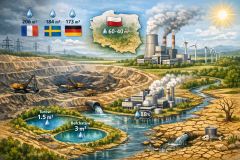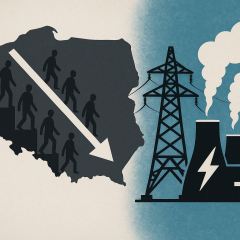As RT-ON we called new members of PETI Committee to proceed the petition no. 1099/2018 that residents of Eastern Wielkopolska send to European Parliament in November last year. The complaint we filed to the EC over a decade ago has not yet been finalized. Nevertheless, we support Konin region in their struggle against ZE PAK and we will be urging European institutions to take steps to stop the damage caused by the exploitation of lignite.
In the time of climate crisis, it becomes clear that protecting the right to clean water is in the public interest. Unfortunately, a particular interest often occurs against the social, breaking the laws established by the European Union and its Member States.
Working in the Konin and Eastern Wielkopolska region for more than a decade, we have seen how this problem is growing. More than 10 years ago, the residents of this region filed a complaint to the European Commission for an improperly carried out procedure for environmental impact of the Tomisławice open-pit mine, local and national authorities did not take any action in this matter. The case has not yet been finalized, and Poland is delaying compliance with the Commission's call to ensure compliance with the regulations on nature conservation in the case of Lake Gopło. The company ZE PAK - exploiting open pits Adamów, Koźmin, Drzewce, Jóźwin, and Tomisławice - continues to destroy the Konin region.
The problem is not only displacement, pollution, and poor land reclamation results. Opencast mines deepen the drought that prevails in Eastern Wielkopolska.
Annually, the open-pit Tomisławice purges from the ground ca. 40 millions of cubic meters of water (ca. 80 m3 / minute) - and it’s only one of 3 currently exploited lignite mines in the region. Ościsłowo is planned to pump out over 30 millons m3/year.. The fields dry up and the farmers either lose their livelihoods or are forced to grow plants more resistant to lack of water, and bringing lower income.
Coal mining using the opencast method creates a cone of depression. The water levels in the lake district Pojezierze Gnieźnieńskie have decreased by an average of 4 meters in about a decade (such as lakes Wilczyńskie or Ostrowskie). On a more distant lake Powidzkie, also in Eastern Wielkopolska, the water level dropped by less than 1 m in the same period.
None of the individual environmental analyzes gives a full picture of the damage caused by the cooperation of all investments in lignite. All of the company's activities lead to the violation of the Water Framework Directive, transposed to the Polish system through the Act on Water Law and Water Management Plans for the Vistula and Oder (PGW Wisła and PGW Odra)
Poland is the one of the countries in the European Union that systematically fail to comply with the Water Framework Directive. The Polish government claims that investments in coal are part of the principle of sustainable development and are an example of a balanced form of human activity and constitute public interest. Where fossil fuel investments are made, derogation becomes a new standard.
Both residents of the region and we do not accept the unilateral definition of an overriding public interest. Vaguely defined energy security cannot stand above water safety. For the coal power industry, there is an alternative - for water there is not.
As RT-ON foundation a month ago, we filed another complaint (no. CHAP(2019)1618) with the European Commission - this time for improper application of the provisions of the Water Framework Directive. It concerns such ongoing investments of ZE PAK in Eastern Wielkopolska, as well as new opencast mines planned by PGE in other regions of Poland. We are observing all investments in lignite in the country and we can see how their collective impact is aggravated by the water crisis.
It is not known how the Polish government justifies deviations from water protection. It has never been analyzed how the ZE PAK mines meet the prerequisites of an overriding public interest. The social and environmental costs of the mine were never estimated by the public institutions nor the miners, and the costs were only partially calculated and based on over-optimistic presumptions.
It is also not known on what basis lignite is supposed to provide Poland with energy security. There are increasingly cheaper energy sources providing a more reliable future in the face of a climate crisis. Both the Polish government and ZE PAK systematically do not include the costs of coal subsidies, prices of CO2 emission allowances and - above all - costs incurred by the local community. We attach the list of only few of reports and analyses that counter the ZE PAK’s and government’s assumptions on how lignite mining’s benefits prevail the costs.
In November last year, together with more than half a thousand inhabitants of the region, a group of local citizens supported by our Foundation submitted a letter no. 1099/2018 to the Petitions Committee. Today, we renew the demands it contains - we call on the European Parliament's Committee on Petitions to carry out a fact-finding mission and then call on the local government and governmental administration of our country to take steps to stop the damage caused by the exploitation of lignite. As full-fledged citizens of the Union, we call on the EU institutions and the European Parliament to take all steps available to them that would make the Polish central and local authorities respect EU legislation to stop the environmental disaster caused by opencast lignite mining.







